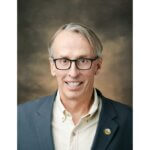Sponsored
Park City Soccer Club celebrates 30 years of community support and player development
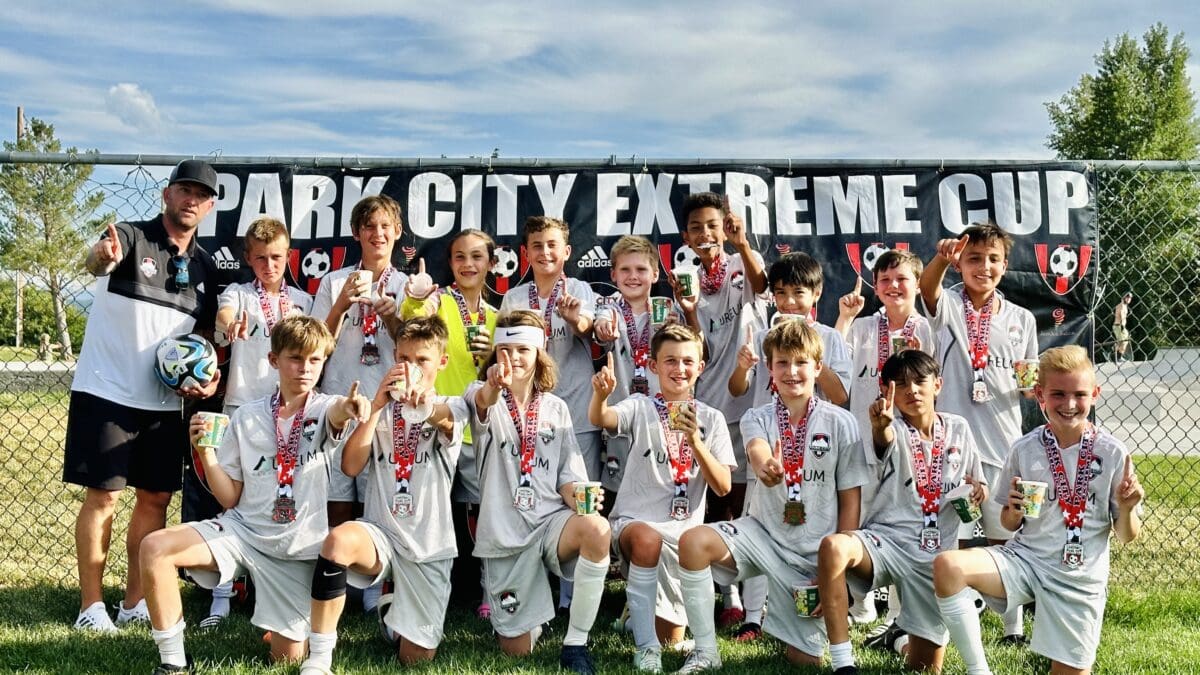
Coach Eli Ulvi with the U13 boys after winning their division in Extreme Cup, July 2023. Photo: Edwin Pankau
Exploring the roots, growth, and impact of the club spanning three decades
Park City Soccer Club has built a deep and skilled leadership team, one that takes pride in their contributions (over the last 30 years of the club) and aims to keep that growth in the support of the soccer community in Park City.
Technical director Elias Ulvi spoke with Neighbors about his role, the direction of the club, and its progression. Ulvi’s extensive resume is peppered with wide-ranging and comprehensive experience in the soccer world, joining the club in 2018. A coach from the age of 16, Ulvi worked hard to learn all he could, emphasizing a long-term athlete development model. The Park City Soccer Club’s progression model provides a scaffolded approach for players to acquire skills and knowledge based on their developmental level.
First, the Foundation Level, which Ulvi described as the ‘Jewel of the Program,’ serves as an entry point for U7 and U8 kids coming out of recreational programs or who may be new in town. Under director Mark Caliguire, who Eli said “…ends up being most kids’ favorite coach of all time,” this level prepares them for the competitive play found at U9 and builds the understanding of what the commitments look like as a youth soccer player. At this level, and all levels, parents are an incredibly important part of athlete development. Eli describes parent involvement as a crucial partnership in supporting these kids and their enjoyment of the game.
Next, kids move into U9s and U10s all the way through U19s, which is the club’s oldest team. At each stage, the staff creates a holistic environment to enable whole-athlete development.
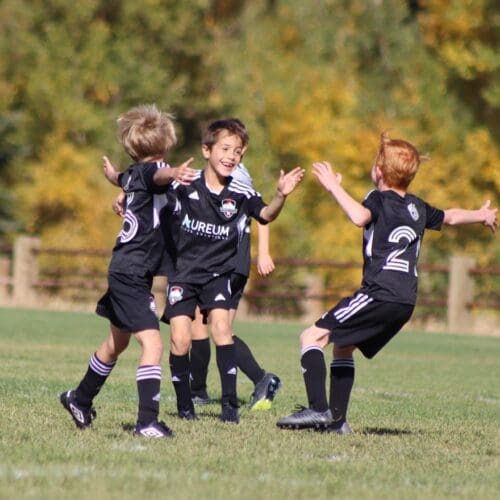
Under the PCSC athlete development model, players build upon foundational skills to prioritize teaching step by step, from the number of competitors on the field, to cognitive concepts, tactical acumen, to the terminology acquisition necessary at each level to be able to play the game and understand what is being asked and coached.
Once kids are competing at the U13 level, the priorities change for what is being coached and what players are gaining skills to achieve. “We have philosophies in what we do at each stage and methodologies for how we train these players; what makes sense for them, understanding who we are working with, using pedagogy to understand what their needs are. Ultimately we are working to empower each athlete to be deliberate in their play, make informed on-field decisions, and take ownership of their experience.” Eli said.
The coaching staff focuses on each athlete’s growth. Throughout the programming, the goal is to build confidence in the player that transcends the sporting environment and supports the athletes’ scholastic success and positive engagement in societal interactions. The framework supports a system of gradual skill acquisition, fading from focusing on the individual to prioritizing the collective competitive success of the teams.
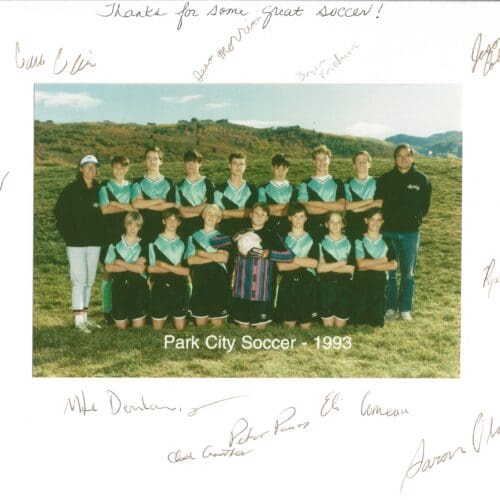
The Founding Era
Competitive soccer in Park City evolved in the early 1990s out of the Park City Recreation Department’s Youth Program. As evidenced by the success of Park City High School’s soccer program (which made nine trips to the finals) and growing interest in the sport, the community took aim at getting kids onto the pitch at a younger age. By 1991, coach and club co-founder Frank Fish established the first of a few “select” teams that adopted the top recreational players to compete successfully in the Salt Lake Valley and in regional tournaments. By 1993, approximately 80 young men were playing on select teams under Frank, as well as John Demkowicz, Brian McInerney, and a few other independent coaches. It became Frank’s dream to organize these select teams into a club, and by 1994, his teams were competing under the name Park City Youth Soccer Club. In order to establish the infrastructure necessary for coordinating various aspects of the soccer program, Frank took it upon himself to hold clinics and train referees in the area. The hiring of Roy Crandall rounded out the needed coaching staff, and in June of 1995, Park City Youth Soccer Club advertised tryouts for boys U15 – U18 teams.
Still, early on, Park City’s summer soccer camps were co-hosted by a men’s college coach out of California named Bob Martin. Eventually, Bob relocated to Park City and brought his own influence to the developing youth soccer scene. Tryouts in 1998 led to the formation of twelve teams, with boys teams in every age group from U11 – U18 and girls teams in every age group from U11 – U14. This was a milestone for the young club and resulted in Coach Martin teaching a coaches’ education program where eleven local coaches received their National “D” license. While the desire to get kids playing competitive soccer took hold years before the need to formalize the organization, according to co-founder Sherie Harding, 1998 was also the year the Club attained its non-profit status under the name Park City Extreme and formalized its first official board with Armin Herteux serving as president, Frank Fish as vice president, and Sherie Harding Walters and Tim Vetter as the other incorporating officers.
The Club’s Foundation
The Club flourished in those early years, with a village of parents and coaches stepping forward to leave their mark on the development of the community’s youth soccer program. From board members and volunteer coaches to others procuring uniforms and pursuing Frank’s desire to establish “a tournament in the mountains,” youth soccer in Park City had a solid foundation. Recreation staff, such as Karen Silvestre Yocum from Park City Rec and Bonnie Park and Steve Parker from the newly formed Basin Recreation, did their part to support the effort. No one quite knows where the name “Extreme” came from, although its legacy lives on in the name of the Club’s annual youth tournament, the Park City Extreme Cup, held each July. In 2008, the Board voted to officially re-brand the club to Park City Soccer Club, adopting both the name and the logo that over 700 players wear today.
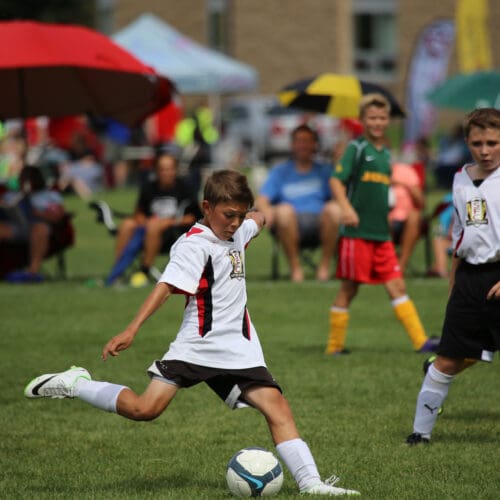
The Modern Era
Many of the founding leaders and coaches are still involved in PCSC. The club’s growth and success necessitated the implementation of sophisticated management strategies and operational structures essential for continued efficiency and growth. Shelley Gillwald, the club’s current Executive Director – forever soccer mom, volunteer, and long-time PCSC supporter – has been instrumental in moving the club forward using those needed strategies over the last 10 years. This included bringing in experienced and credentialed coaches. In 2018, Elias Ulvi was brought in to run the club with Shelley and serve as the Technical Director. Eli hires and supervises the highly-qualified coaching staff, only one of many facets of the club’s technical progression. As well as networking and fundraising at a higher level, the club has been able to expand at every age group for both boys and girls, with team counts previously ranging in the 20s now up to 35 teams. Such innovation and focus on improvement have also impacted the growth of The Extreme Cup. Through meticulous planning and dedication, Shelley and the tournament committee redefined what it means to host a soccer tournament while focusing heavily on sustainability and fostering a culture of inclusivity and sportsmanship, where fair play and camaraderie reign supreme. To keep up with this vision, Cora Lucero is at the helm as tournament director, coordinating hundreds of volunteers to host over 8,000 participants from 450 teams across 16 venues and 45 fields.
The leadership team, with board approval, spearheads another successful initiative: the scholarships. Raised from The Extreme Cup, as well as community partnerships and grants, not only open the doors of opportunity but cultivate an environment where socioeconomic barriers dissolve, and the joy of the game becomes a shared experience for all. These scholarships greatly benefit any community members who may need the financial support necessary to participate, supplanting costs ranging from club fees and uniforms to tournament travel. While recognizing that not all scholarship recipients in the area stem from the Latinx community, given Park City’s vibrant hospitality and tourism industry—which boasts a substantial representation of Latinx individuals—it is important to acknowledge the profound influence of Latinx families within our diverse demographic landscape and the inclusion of these children is significant.
Through dedicated grant writing and tireless efforts to connect the community with fundraisers and secure vital resources (Live PC, Give PC, and Youth United, to name just two), Shelley’s dedication serves as a beacon of equity and inclusion, enriching our community and empowering individuals to thrive both on and off the field.
Reflecting on Park City Soccer Club, from its humble beginnings to its current prominence, the local soccer community’s passion, perseverance, and support have been the driving forces behind its success. Every step has been marked by dedication to the sport and the athletes it serves. The story of Park City Soccer Club is not just one of athletic achievement but also a testament to the power of unity and vision within a vibrant sporting community. Stay tuned this summer as we continue a look into the club’s current teams and coaching staff.


















